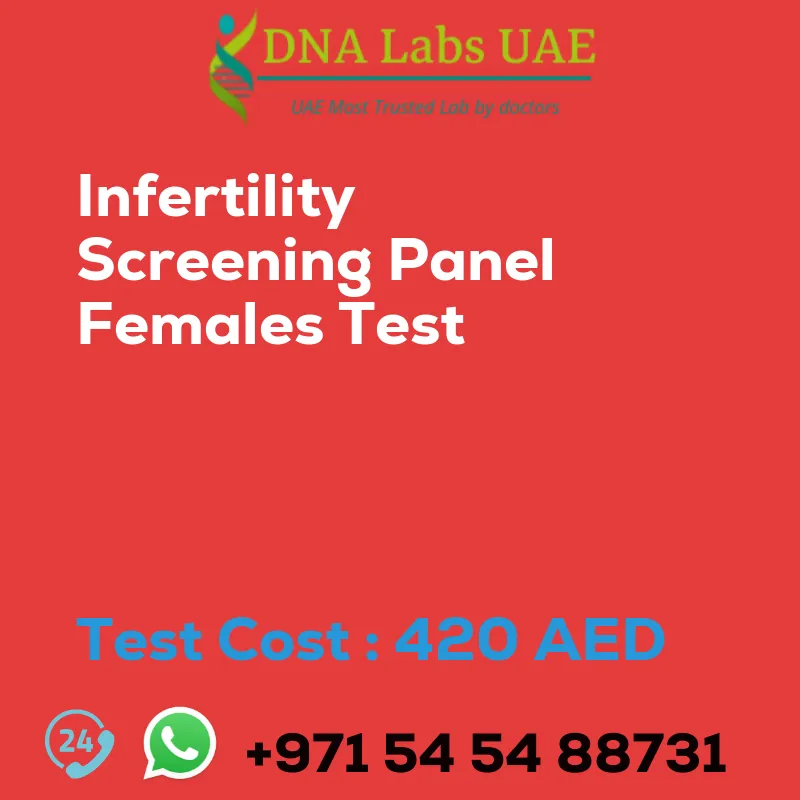INFERTILITY SCREENING PANEL FEMALES Test
Test Cost: AED 420.0
Test Components:
- FSH
- LH
- Prolactin
- Testosterone, Total
- TSH Ultrasensitive
Sample Condition: 3 mL (1.5 mL min.) serum from 1 SST. Collect specimen 4 hours after the patient has awakened. Overnight fasting is preferred. Ship refrigerated or frozen.
Report Delivery: Daily
Method: Chemiluminescent Immunoassay
Test Type: Disorders of Endocrine System, Infertility
Doctor: Gynecologist, Endocrinologist
Test Department:
Pre Test Information: Overnight fasting is preferred. Collect specimen 4 hours after the patient has awakened. In females, preferred sampling time is Day 2 / Day 3 of the menstrual cycle.
Test Details:
The infertility screening panel for females is a set of tests that are conducted to evaluate the potential causes of infertility in women. These tests can help identify any underlying conditions or factors that may be preventing a woman from getting pregnant.
The panel typically includes the following tests:
- Hormone levels: This includes testing for levels of hormones such as follicle-stimulating hormone (FSH), luteinizing hormone (LH), estrogen, and progesterone. Imbalances in these hormones can affect ovulation and fertility.
- Ovarian reserve: This test measures the quantity and quality of a woman’s eggs. It usually involves an ultrasound to count the number of follicles in the ovaries and a blood test to measure anti-Mullerian hormone (AMH) levels.
- Thyroid function: Thyroid disorders can impact fertility, so testing for thyroid-stimulating hormone (TSH) levels is often included in the panel.
- Pelvic ultrasound: This test uses sound waves to create images of the reproductive organs, including the uterus and ovaries. It can help identify any structural abnormalities or conditions such as polycystic ovary syndrome (PCOS).
- Hysterosalpingogram (HSG): This is an X-ray procedure that examines the shape and condition of the uterus and fallopian tubes. It can detect any blockages or abnormalities that may be hindering fertility.
- Genetic testing: In some cases, genetic testing may be recommended to identify any genetic abnormalities that could be causing infertility.
- Blood tests: Additional blood tests may be conducted to check for conditions such as diabetes, autoimmune disorders, or infections that could be affecting fertility.
The specific tests included in the infertility screening panel may vary depending on the individual’s medical history and symptoms. It is important to consult with a healthcare provider or fertility specialist to determine which tests are appropriate for each individual case.
| Test Name | INFERTILITY SCREENING PANEL FEMALES Test |
|---|---|
| Components | *FSH*LH*Prolactin*Testosterone, Total *TSH Ultrasensitive |
| Price | 420.0 AED |
| Sample Condition | 3 mL (1.5 mL min.) serum from 1 SST. Collectspecimen 4 hours after the patient has awakened. Overnight fasting ispreferred. Ship refrigerated or frozen. |
| Report Delivery | Daily |
| Method | Chemiluminescent Immunoassay |
| Test type | Disorders of Endocrine System, Infertility |
| Doctor | Gynecologist, Endocrinologist |
| Test Department: | |
| Pre Test Information | Overnight fasting ispreferred. Collectspecimen 4 hours after the patient has awakened. In females, preferred sampling time is Day 2 / Day 3 of the menstrual cycle. |
| Test Details |
The infertility screening panel for females is a set of tests that are conducted to evaluate the potential causes of infertility in women. These tests can help identify any underlying conditions or factors that may be preventing a woman from getting pregnant. The panel typically includes the following tests: 1. Hormone levels: This includes testing for levels of hormones such as follicle-stimulating hormone (FSH), luteinizing hormone (LH), estrogen, and progesterone. Imbalances in these hormones can affect ovulation and fertility. 2. Ovarian reserve: This test measures the quantity and quality of a woman’s eggs. It usually involves an ultrasound to count the number of follicles in the ovaries and a blood test to measure anti-Mullerian hormone (AMH) levels. 3. Thyroid function: Thyroid disorders can impact fertility, so testing for thyroid-stimulating hormone (TSH) levels is often included in the panel. 4. Pelvic ultrasound: This test uses sound waves to create images of the reproductive organs, including the uterus and ovaries. It can help identify any structural abnormalities or conditions such as polycystic ovary syndrome (PCOS). 5. Hysterosalpingogram (HSG): This is an X-ray procedure that examines the shape and condition of the uterus and fallopian tubes. It can detect any blockages or abnormalities that may be hindering fertility. 6. Genetic testing: In some cases, genetic testing may be recommended to identify any genetic abnormalities that could be causing infertility. 7. Blood tests: Additional blood tests may be conducted to check for conditions such as diabetes, autoimmune disorders, or infections that could be affecting fertility. The specific tests included in the infertility screening panel may vary depending on the individual’s medical history and symptoms. It is important to consult with a healthcare provider or fertility specialist to determine which tests are appropriate for each individual case. |







